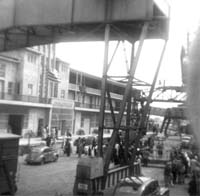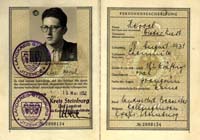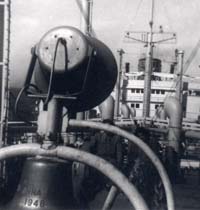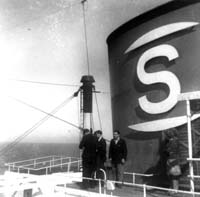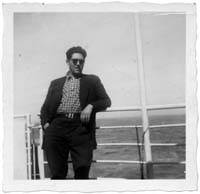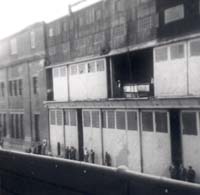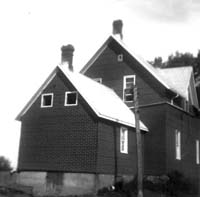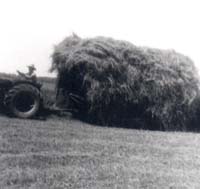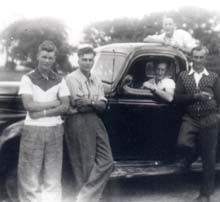Sobey Wall of Honour
Column
28
Row
13
English Translation from Peter Hessel's Diary
Aboard the M.S. Anna Salén in the northern North Sea, off the Scottish coast.
Tuesday, June 17, 1952:
On Friday (June 13th) I saw the tall ship Pamir, a German training vessel, in Bremen's Europa Port.
On Saturday (June 14th) I was told at the documentation office that I was on the passenger list of the M.S. Anna Salén, which was to sail for Halifax on the 16th. In the movie theatre we listened to a talk about our voyage, presented by the 2nd Escort Officer (female) of the Anna Salén. I volunteered to work for the documentation office aboard the ship.
On Sunday (June 15th) I was examined, received my train tickets for Bremerhaven, and my passport. That's when I was finally completely convinced that I would be sailing. On Saturday I sold my winter coat to a pawnbroker in Vegesack. I didn't want to spend my last few days in Germany completely without money. On Saturday night we were shown a movie called "Der Heiratsschwindler" (The Marriage Swindler) which was 20 years old and really not a very good way to say goodbye to German films. The sound was impossible. This was followed by a documentary about our voyage. The night was short, and everybody slept more or less uneasily.
Yesterday morning, Wednesday, June 16th, I got up shortly after 5. We had to deliver our bedding to the block supervisor. After breakfast we went to customs inspection in the large baggage hall. But nothing was checked; we just walked through. The baggage was loaded onto trucks, and we were channeled through once more. We boarded buses that took us to the railway station at Vegesack. Of the roughly 900 emigrants, I was number 19 and thus always one of the first. Boarding took no time at all. The train began to move at 10:15 a.m. There was some shuttling at Burg, and then we continued via Osterholz-Scharmbeck to Bremerhaven. Through fairly desolate, poor country with acid meadows, heath, moors, and meager fields of rye and potatoes.
We were in Bremerhaven at half past twelve. As we arrived, we saw the gray ship General Harry Taylor, which was taking emigrants to the USA, and right behind it, in gleaming white, the newly overhauled Anna Salén, a 12,000 ton Swedish motor vessel just refitted for taking passengers from New York to the Helsinki Olympics this coming summer. In the railway station, we were "channeled through" again (police and customs inspection). They only asked: "How much money do you have?" Nothing was checked. Then we went aboard the Anna Salén in single file, by number. The crew of 70 came from all the nations of Europe. They showed us the way to our sleeping quarters. Each quarter contained about 40 beds (20 bunk beds). The quarters are below deck; ours is far left. I have an upper bunk. I am told it is better because no one will vomit on my head. I set my suitcase on my bunk and went back on deck, looking for the IRO office. I mailed a postcard home and took a picture of the Columbus Dock with all those people saying goodbye. I also took a photo of our luggage in huge nets that were swung on boby crane from a railway car.
The ship sailed at half past two. What an important event! There was much waving, some women had tears. The ship's railing was packed with people. Just as we were leaving, the sun came out, but it rained the rest of the day. The ship was towed by the tugboat Sirius: four times around its own axis, to adjust the ship's compass after the overhaul. In the meantime, the General Taylor disappeared from sight. At 4 o'clock we saw the M.S. Deutschland sail for Bremen. At half past four, the tugboat threw over the towline, and we were moving under our own steam. We passed the Columbus Dock once more. On both sides of the wide river [Weser] estuary, we watched the shoreline of Germany, with its small villages behind the dykes, disappear. Then the coast was gone, only a few fishing boats could be seen, and some buoys. The Anna Salén made its way toward the northwest, through a calm sea. In the evening, Helgoland came into view. For hours we could see this devastated red island (NOTE, 1990: after massive bombing attacks during the war and attempts to destroy the whole island with dynamite charges after the war), a last reminder of home. When it, too, faded into the darkening horizon, a blinking light on top of its old flak tower could be seen for a long time. Then it was just water. Once in a while a lightship, or a little fishing boat. The meals are very good and ample. The dining rooms are far below. The chairs swivel and are bolted to the floor. In the evening, the ship bobbed quite a bit, and some people were seasick and "fed the fishes". So far I have felt nothing except a somewhat heavy head. The night was quiet. I got up at half past five and went on deck. Yesterday we thought we would take the usual route, through the English Channel. But this morning we found that we were going north and approaching the northern tip of Scotland. Sometime today we should therefore pass between Scotland and the Orkney Islands. The sea is calm, but the ship is rising and falling a lot. It is sometimes necessary to hold on to something, but I'm used to it already. In the morning the sun was shining, and I saw three dolphins jumping around the bow of the ship. Now it is cold again, and raining. There is always something going on in the dance hall, but there aren't enough girls. I prefer to be up on deck.
AG Diary: June 17: In the North Sea.
Aboard the Anna Salén, between Scotland and the Orkney Islands.
Wednesday, June 18, 1952
Yesterday many passengers met their doom. I estimate that a quarter of them have already made their sacrifice to Neptune. The Anna Salén was rolling quite a bit in very high waves, and some of the breakers were coming right over the 8-m sides of the ship. It wasn't a storm by any means, but the rolling was quite unpleasant, especially below deck. I always expected to see land soon, because I figured the Scottish coast could not be far off. Soon we were told that we would not pass south of the Shetlands, but north, i.e. between the Shetlands and the Orkneys.
After supper the sun came through for the first time, and it remained clear and warmer until evening. A Dutch fishing fleet consisting of about 50 vessels crossed our path. Their nets were marked above water by large balloons and flags, and our ship often had to change course to evade these things that are perhaps a kilometer in width. Some boats were very close, and I took a picture of one. The fishermen waved and called over to us, but they didn't reply to "Hummel Hummel". Their tubs were doing an incredible dance. Sometimes it seemed that they had disappeared completely, and only their masts were out of the water, but a moment later their bow would rise up, and then the stern, so that I could see the wheel. When the last fishing boots had faded into the horizon, we were again alone in the endless loneliness of the sea. We were now going west, straight into the setting sun. In the first night we had moved our watches back by 53 minutes, last night by 21 minutes. While it is 6 o'clock here, it would be about a quarter past seven in West Germany.
Last night we were given a coupon worth $1.50 that has to be spent here on board. Today a drugstore and a snack bar will be opened where everyone can buy coke and liquor. But I intend to buy some lasting things. First of all it isn't advisable to drink too much, and secondly I don't feel the need.
At noon yesterday we had an emergency drill. Under every bed is a life preserver made of cork, which we had to put around our neck. Each group has its own lifeboat. We had to go up on deck for a short while only, and then the drill was over for us. I took a picture during the drill, but it is a shame that the sun has become such a rarity. Then the crew had to get the lifeboats ready. As far as we were concerned, it was taking them quite a while.
Last night I took a chance and went to the dance floor, where I did a few dances, mostly with a little Italian girl I had met in Lesum. She speaks as much German as I speak Italian. It is funny, but it will probably happen frequently that I won't be understood.
I read in the ship's newspaper today that we would pass the Orkney Islands at 4 o'clock this morning. I got up at half past five, but all I could see was water. It was raining, and visibility is moderate, but the sea is calmer now. In spite of that, more people are seasick now.
AG Diary: June 18: Between Scotland and the Orkney islands.
Aboard the Anna Salen, on the Atlantic going southwest,
Thursday, June 19, 1952
I made a mistake yesterday, and when I looked at my atlas, it dawned on me. The Shetlands are, of course, the northern group of islands, not the Orkneys. According to the ship's newspaper we were to pass the strait at 4 a.m. I got up at half past five but saw only water. I thought I had missed it and that we were in the open ocean. But by 7 a.m. we saw land on the western horizon, and I knew that we were arriving late. And that's what had happened. To the left, the Scottish mainland appeared, to the right the Orkney Islands. Like rocky castles in the sea. There were white lighthouses, low fishermen's cottages, but also fields, probably with oats, because the green was rich, not like rye. In between we saw ploughed fields and country lanes. Then again there were wide areas of monotonous pale-green. I don't know whether it was forest or grassland. Behind these were majestic mountain peaks, usually conical in shape and probably of volcanic origin. In the course of the morning, the Orkneys faded away, but we continued along the Scottish mainland till 3 in the afternoon. I photographed the steep coast as our last reminder of Europe. But then, to the southwest, another land mass appeared: Lewis, the largest and northernmost of the Hebrides. Here, too, I saw green land, villages, and lighthouses, at least along the coast. Behind them were towering, wild, Rocky Mountains.
In the morning a freighter had passed us, in the afternoon another, which may be headed for Iceland or Greenland. In the afternoon it was sunny and relatively warm. I sat on deck and let the ship rock me. Many people vomited, and my stomach felt a little strange, too, but I was able to overcome the feeling. The ship was really rolling now although the sea was not all that high. - Yesterday the "drugstore" sold something for the first time: there was nothing but cigarettes. $1.25 a case of 200; that is, of course, paradise for smokers. I still have my coupon. The price list indicates what will be available later: 50 g of chocolate for 10¢, Trumpf Praletten chocolates 10¢, fine soap 10¢, 6 x 9 films 40¢, 10 razor blades 15¢ and 20¢, shoe polish 10¢. I'll probably buy 3 films, a can of shoe polish, and a pad of airmail paper. In German money all this would cost about DM 6.50, and I would get it for $1.45. Which means that I have 5¢ left over to buy 2 packs of fruit candies, 5 boxes of matches, one pencil or one picture postcard.
Last night movies were shown in the dance hall; 8 mm American movies. Some were slapstick, some about sports and pseudo sports. There was a Mickey Mouse cartoon. Only one was interesting: it showed how a bird (no idea what species) killed a rattlesnake and saved its master, a Mexican boy. After the movies, there was dancing, but I polished my riding boots and went to bed, the ship was rolling too much. I also have a terrible cold (cough). The watches were turned back again, this time by 45 minutes, a total of 104 minutes now. It is half past seven here, and a quarter past nine in Itzehoe.
We are now in the open Atlantic, and we have to get down from the 59th to the 45th degree latitude. I don't understand why this detour was chosen, and I doubt whether we will be in Halifax on the 24th. - My ballpoint is empty, and I hope I can get a refill here.
AG Diary: June 18: On the Atlantic.
AG Diary: June 19: On the Atlantic.
Aboard the Anna Salén, on the Atlantic going southwest,
Friday, June 20, 1952
Yesterday I played table tennis and chess. I also played with the Escort Officer's radio to hear some German news. But the only German-language station I got was Moscow. In the evening a steward was able to get a German broadcast from London. We are planning to listen to the news regularly.
We are now in the Gulf Stream, but it is still cold and rainy, with poor visibility. Yesterday morning two freighters collided not far from us, a Greek and a Norwegian. We also had another drill yesterday. - In the store I spent my $1.50 on two 6 x 9 films, a ballpoint pen, a can of shoe polish, a pad of airmail paper, two packs of cookies, and some chewing gum.
AG Diary: June 20: On the Atlantic.
Aboard the Anna Salén, on the Atlantic going southwest.
Saturday, June 21, 1952
Yesterday went with playing table tennis and chess. There was nothing to do on deck, since the fog limited visibility to less than 10 m. In the evening again so-called movies. This time the trash was even more predominant that the first time. If that is American culture, I'll say no thanks. But it is strange: the majority of the passengers present were as happy as can be about these stupid films. They laughed and yelled and were beside themselves with enthusiasm when some characters beat each other half to death, or when Mickey Mouse raced through the sky on a rocket. How poor those many people are! - Yesterday and the day before, we turned the watches back by 38 and 37 minutes, respectively. Total now: 184 minutes (three hours and four minutes). It is seven o'clock in the morning here, 10:04 back home.
AG Diary: June 21: On the Atlantic.
AG Diary: June 22: On the Atlantic.
Aboard the Anna Salén, on the Atlantic going west.
The watches were turned back again by 64 minutes - a total of 248 minutes now. It is seven o'clock in the morning here; 11:08 back home, almost lunch time.
The last two days were very monotonous. The sea is calm, but the weather is still cold and rainy. My main activities were table tennis and chess. Last night it was announced over the intercom system that there would be a Bible hour followed by discussion. I went together with a few others, all eager to do battle, and to discuss philosophical problems. It was a very stimulating evening. Especially the discussions that followed stirred everybody up. The speaker, a "Free Christian" without church affiliation, opened with a prayer, read from the Bible, and then held a speech the meaning of which probably didn't make much sense. But he made some extraordinary statements. He claimed to be infallible and free of sin, and that he had frequently encountered the Holy Ghost. He said he had been cured of fish poisoning, just by praying. He said it would be a sin to go to a doctor, since all illness is the result of sin. He was asked why an innocent child six months old would suffer from mid-ear infection. He said that the child was being punished for the sins of its parents. He was so stuck on his strange interpretation of the Bible that he thought of himself as a new Messiah. I could see that he looked at his own inner self with pleasure. He must be sick somehow, maybe narcissistic.
The little group of listeners, about 40 people, gave him a hard time. He had us non-Christians against him, but also Protestants, Catholics, Jehovah's Witnesses, and members of other sects. We argued so much that he kept shielding himself with the Bible. He demanded that only those should speak who could use scripture to prove his words wrong. But we wouldn't agree to that, and finally, when the nonsense was too blatant, we left the room demonstratively.
Now little groups were standing around everywhere, debating about religious things. Everyone condemned this insolent man who had dared to present himself as an apostle, although he was known to take pills against seasickness.
AG Diary: June 23: On the Atlantic.
Aboard the Anna Salén, on the Atlantic going west.
Tuesday, June 24, 1952
After breakfast yesterday we received our travel documents from the documentation centre. Vaccination book, a temporary Canadian I.D. card, the transportation contract, and the loan agreement. The papers indicate that we will first be taken to a camp at Ajax, Ontario, which is supposed to be 30 km from Toronto. It should therefore be a day's train trip away from Halifax. (Note added later: It takes 3 days by train from Halifax to Toronto).
In the afternoon we visited the bridge, and those with a camera took lots of pictures, for the sun was shining from a blue sky. In the wheel room we saw two wheels, one automatic and one semi-automatic. There were sextants, compasses, a machine telegraph, a fire alarm system, and - most interesting - a radar. It stood in an enclosed room and consisted of a metal box, slanted downward, similar to a peepshow viewer. It shows everything that isn't water: ships, icebergs, heavy rain clouds, hail showers, etc. At that moment, five ships, all fishing vessels, were in view. They appeared as little light spots over the black background. Their position can be read with accuracy. The radar in our ship could indicate up to 80 miles, i.e. about 120 km.
In the map room they showed us the sea maps, the echo sounder, etc. In a special room we saw the gyrocompass, a giant apparatus that works electromagnetically. Many years of study, a thorough knowledge of mathematics, physics and engineering are necessary to handle these complicated instruments. - Standing in a bracket were colourful flags, so-called pennants: they were the signal flags, a different colour combination for each letter. Above the bridge, near the smokestack is the external part of the radar, a high mast with a slowly turning semi-circle that absorbs the beams.
Now ships are passing often, and a few seagulls can be seen again. Last night movies were shown again. After the show, at half past 9, we were surprised that it was dark already. We couldn't figure it out because the loudspeaker announced that the watches should be turned back by 28 minutes. But then came the correction: not 28 minutes back, but 19 minutes ahead. Perhaps they had made a mistake two days ago. We have always gone west, never east. So now the difference is only 229 minutes.
This morning at 4 o'clock we passed the southeast corner of Newfoundland, Cape Race. But I got up as late as 6 and saw only water. Tomorrow morning we will land in Halifax. I think that by evening we should see the coast of Nova Scotia. Time to pack the suitcase again. Everybody is feverishly waiting for the great adventure: setting foot on the American continent. I hope the weather stays clear, so that I can take pictures. I still have about 40 pictures left. We will pass through four Canadian provinces: New Scotland (Nova Scotia), New Braunschweig (New Brunswick), Quebec, and Ontario.
